Interview: Alyssa Ages is Raising the Bar
A conversation with author, strongman athlete, and mother, Alyssa Ages on redefining body image, strongman culture, the power of strength and more.
Flashback to life in late February 2024, when I first crossed paths with this month’s interviewee, Alyssa Ages.
I’d blown out my knee in a jiu-jitsu competition a few weeks earlier, and my lifestyle had gone from being extremely active to being in an existential crisis. So much of my life for the seven preceding years had been in and around the world of jiu-jitsu. Then the injury happened. Without that movement practice, without that piece of my identity in play, I felt very lost.
In hindsight, there were benefits to this “oh shit” period: with no jiu-jitsu and a major surgery for the injury on the horizon, I had time to think and explore other sports, hobbies, and ways to “stay strong.” But at the time, I was very sad, and my husband suggested a way to combat the woe from my combat sports-inflicted injury: by taking a road trip. Specifically, a road trip to Columbus, Ohio, to check out one of the biggest sporting festivals in the United States: The Arnold.
The three days I spent in the Greater Columbus Convention Center were eye-opening for a number of reasons, chief among them that there was a BIG world of diverse, passionate sporting communities outside of jiu-jitsu. As I hobbled through the halls with my ailing leg, I caught glimpses of so many kinds of sports, from the more “conventional” (powerlifting and bodybuilding) to the more surprising (e.g. foosball and medieval fighting). Somewhere amid the pre-workout supplements and energy drink samples in The Arnold Expo, I also found “one of my own”: an author and strongman athlete with an inspiring story into the world of strength culture, Alyssa Ages.
Last month, Alyssa and I spoke about her book, Secrets of Giants: A Journey to Uncover the True Meaning of Strength, her experiences as a strongman competitor, perspectives on body image, training through different life stages, and raising two daughters with a healthy relationship to fitness and their bodies. I hope you enjoy it!
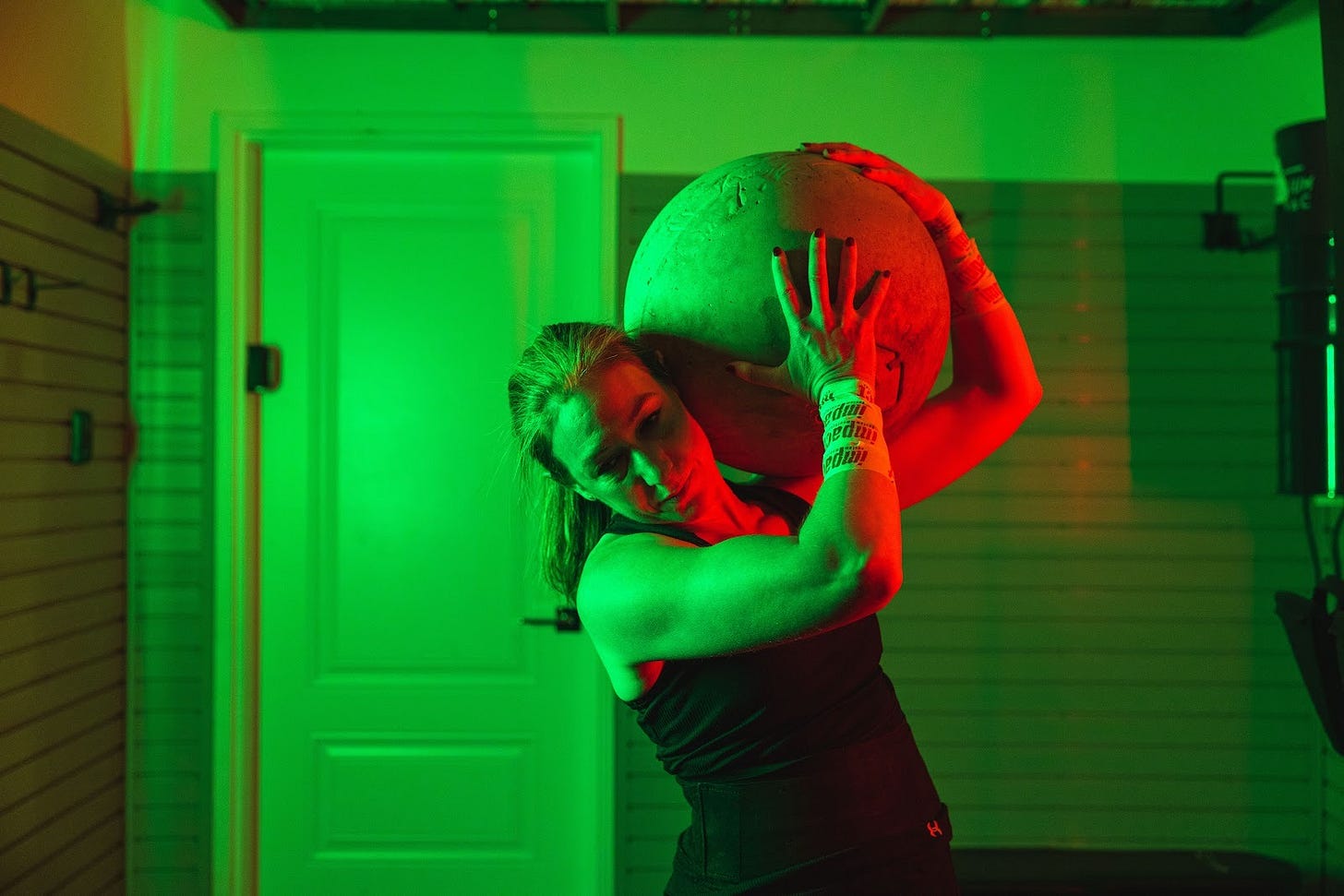
From Tabloids on Treadmills to Strongman Competition: Alyssa's Journey Into Fitness
Erica: Hey Alyssa! Starting off, I’d love for you to share about your background: both where you're from originally and your journey to where you are now when it comes to your relationship with fitness.
Alyssa: I live in Toronto now but was born and raised in New York. My dad was a marathon runner, and my mom did more of the “Jane Fonda workout tapes” type of fitness. I was not athletic at all when I was younger: I did sort of the requisite "played field hockey for a season in high school," and I would read an issue of People magazine on the treadmill or Stairmaster in college—that was about it.
I decided on a whim to train for and run a marathon along with a roommate at the time, who was planning to do one. I spoke to my dad about it, and he said, "If you're gonna run a marathon, I'm gonna come out of marathon retirement and run it with you."
I started in the gym doing run-a-minute, walk-a-minute kind of thing. The first race I signed up for was a 10K, and after that I just decided to go all out. I started training for the New York City Marathon. I ended up getting a stress fracture and had to bow out that year, but I came back and ran it the next year, and then just kept running marathons.
Erica: So how did you go from running marathons to competing in strongman?
Alyssa: I'm very much the kind of person who's like, "What am I chasing down right now?" I went from running marathons to thinking, "What's the next ridiculous thing I can do? I'm going to do a triathlon." I trained and did a sprint triathlon, but immediately after that, I signed up for a half Ironman—why go small?
I did half Ironmans and Olympic distance triathlons, and then did a full Ironman. At the end of that, I thought, "This is a lot of hours on my feet and on a bike. I want to do something different."
I found my way to CrossFit, and through CrossFit, met someone who said, "You gotta try Strongman." I went to one class and absolutely fell in love with it. Something about this idea that you can look at this immovable object and move it was really captivating right away.
That's what I've been doing for 10 years, minus a few years when I was having my kids and postpartum. To be fair, I was still training strongman, but I was not competing for those couple of years. I got back into competing the year that I turned 40, and that's where I am now—well, past 40, but competing in my 40s.
Pictured above, early moments following Alyssa going all-in on strongman.
Alyssa’s Evolving Relationship with Fitness, Body Image, and Strength Over Time
Erica: You mentioned not being athletic when you were younger, but finding yourself being goal-oriented. What do you remember about your relationship with fitness, your body, and athletics when you were younger, even as a teenager?
Alyssa: Even though my dad ran marathons, because he was the male figure in the house, it didn't register that that was what I could do. It was just "dad does that," whereas when my mom would do the workout tapes, I thought, "This is what girls do." It wasn't even that conscious at the time—I just did what my mom did because that seemed like the thing to do.
I remember how early in my teen years all the diet trends started: first it was Atkins, then when we were eating just carbs because fat was bad, then fat was…good? It was just a cycle of confusing things. I remember having a set of free weights in my room—little five-pound dumbbells—and watching Denise Austin tapes at that time.
My understanding back then was that exercise wasn't about trying to reach a goal: it was just about how you look. It was the era of Kate Moss, the "nothing tastes as good as skinny feels" and all that. The people who were competing were on TV, and the rest of us just did a whole bunch of crunches until we got a six-pack. Because I didn't play team sports, I really didn't have any competitive spirit. It wasn't until I started in my 20s that I realized, "Oh, I can be competitive just with myself," which was awesome.
Erica: Between your 20s and now, what changed about your attitude around fitness, especially going through motherhood and postpartum?
Alyssa: Between my 20s and when I became a mom, I gained an understanding that I could chase a goal that wasn't related to my body. To be fair, it's always in my head: I don't think you grow up with two decades of that mindset and then it just goes away. Even if I'm training to pull a truck, I'm still also thinking in the back of my head whether all of this training will make me look a certain way.
I haven't made all those thoughts about appearance magically go away. But now when I have those thoughts, I actually have the ability to go, "Hey, you're thinking that right now," and question it.
In the last couple of years, as my kids have reached the age where they understand things, that has changed how I talk about my body. They can see if you're eating something different from them at the table. They can hear how you talk about exercise. I'm constantly having to not say things like, "I don't look good in these pants," because the second I say that, they understand that there's "good" and "bad" in your body and how you're dressed. I don't want to be the person that puts those thoughts in their head.
On “Bulkiness,” Evolving Standards, and Expectations of Female Bodies
Erica: You write a great history of female physique standards and how they’ve evolved since the 1900s in your book. As a culture, where would you say we are now in terms of expectations for the ideal female body, and what's influencing it?
Alyssa: I think there are really good things and really bad things about where we are right now. It's the double-edged sword of social media.
On one hand, we’re seeing that same thing, where in each decade we had to look a certain way, but with social media, we're seeing trends and expectations week to week: "Do you have a hip dip?" "We're being really tiny—no, we're being really curvy now—no, we're having muscle now." It's gotta be exhausting, especially for teenage girls who are thinking, "My body cannot change this quickly."
On the other hand, we now get to see a massively huge range of different types of bodies because of social media. You aren't limited to magazines controlling what bodies we see as the "ideal." You can find someone your shape. You can find a whole community of people who are your shape and size who want to exist in that body and just be happy about it.
As far as women with muscle, I still don't think we're there yet. Even though we are saying, "Be strong, it's really important to be strong, we're all talking about strength training now," if you walk out there and you look like half the bodybuilders that you would see at the Arnold, you're still going to be seen as a freak. You're still going to be seen as too muscular or "mannish."
I don't know if we're ever going to get there. I hope we do, but I think that's a bigger ask than people are capable of right now.
To be fair to men, they have a hard standard too—Superman. That's not easy either. Imagine growing up as a skinny little boy thinking, "I have to get there. How?" It's a lot worse for women, but I like to have a little bit of empathy for the guys, too.
Erica: You bring up this fear of "getting bulky" from strength training in your book. Do you think that bulkiness continues to carry a negative connotation with regard to female bodies and expectations?
Alyssa: When I started in strongman, there was this mix of people talking to me about bulkiness. One group was the people who don't do strength sports saying, "Oh, I don't think I would want to do that because I don't want to get bulky" or "You shouldn't do that because you're going to get bulky. Guys don't like that type of look."
The other group was the people in the Strongman or CrossFit world, and they'd say, "You can do this. You're not gonna bulk up."
In either scenario, there’s this suggestion that "bulky" is this negative thing. I looked up the definition of “bulky” when I was writing the book, which was "taking up much space, typically inconveniently." That really hits the nail on the head.
I think it goes back to “what's the prevailing idea of how women are supposed to look?” We reject this idea of women being bulky and muscular because it's "inconvenient"—because it's challenging what we think women are supposed to look like. There are a lot of insecure men who think if women look like men, then men don't get to be men anymore.
On Strongman Training, Culture, and the Origins of the Sport
Erica: In my rudimentary understanding of strongman, based on reading your book and watching The Arnold, there’s the press, the deadlift, crucifix, farmers hold, and stone-to-shoulder as part of a given Strongman event. Is that a fairly standard repertoire, or does it vary?
Alyssa: Strongman is super weird in that no competition will be the same. Your standard amateur competition is typically comprised of five events. It usually starts with something pressed overhead—that's probably because it gets dangerous if you're tired. But it could be anything—it's never going to be a barbell, but it could be an axle, a log, a circus dumbbell, a keg, a sandbag—anything that goes over your head.
The other events will be a mixture—usually some sort of deadlift, some sort of carry. My basic definition of strongman is this: it is picking up a heavy, odd object, and then either standing there with it, walking with it, putting it over your head, throwing it, or putting it back down on the ground. At high-level competitions, Atlas Stones will be the last event 99% of the time, but you don't always have stones in an amateur compion.
Erica: came up with the concept of a strongman competition?
Alyssa: “World's Strongest Man” started in the 1970s as the first sanctioned strongman competition. Before that, you had vaudeville strongmen in the early 1900s, the ones in the circus tents. Katie Sandwina lifting her husband over her head or picking up a cannon. There was Zishe Breitbart who dragged a wagon load of 10 men down Fifth Avenue with a cart held by a strap in his teeth. It was more of a freak show.
“World's Strongest Man” brought the idea of doing these wild feats of strength to television. The guys they brought on—none of them were "strongman athletes" because that didn't exist yet. They had football players, powerlifters, Lou Ferrigno, the two-time Mr. Universe who played The Incredible Hulk. The mandate was, "Just get as strong as you possibly can, and then you'll find out what you're doing when you get there."
As for the female scene, America's Strongest Woman didn’t emerge until the '90s—so it’s fairly recent. Women were doing these kinds of things in the vaudeville scene and circus tents, but a high-level women's strongman competition only came about 20 years after the men got theirs.

Erica: How would you describe the strongman culture?
Alyssa: Strongmen and strongwomen are, surprisingly, some of the nicest, most supportive people you will meet. It feels odd because these are a bunch of huge people lifting big, giant, heavy things doing this really aggressive type of sport, but everybody is so kind.
It is the only sport that I can think of where the person on the sidelines cheering the loudest for you is your biggest competitor. I think that is because this is a sport that is all about doing the most that the human body can possibly do. And if your body can't do that today, you still want to see someone else do it. We all just want to see what's possible: there’s the idea of “If this person shows what’s possible, maybe down the road that is possible for me."
It's also really supportive in that if you show up to a competition and you have forgotten a piece of equipment, someone will just lend you theirs. I've had that so many times. At one of my last shows, I wasn't going to use gloves to do a truck pull, and someone was like, "No, no, try it—here, take mine." Or if you don't bring tacky for the stones, you just know someone else is going to have it. People bring communal snacks, and everybody shares everything.
You would never go, "That person's missing something? Too bad, I'm going to win now." We all want to beat that other person at their best, so I would rather you take my belt and do your best possible performance than me win on a technicality because you forgot a piece of equipment.
At one of my competitions years ago, we were doing a Husafell Carry, and it was totally different than what I was used to. I went up to one of the other athletes in my weight class who I was competing against—it was her piece of equipment from her gym—and she said, "Let me take you over and show you how to lift it." Right before we went out, she showed me what to do.
Pictured above: Alyssa at work in a Strongman competition in 2023.
On “Taking Up Space” and Taking Risks
Erica: In your book, you talk a lot about the concept of "taking up space.” What does “taking up space” mean to you and how has it influenced your life as an athlete and beyond?
Alyssa: For me, the idea of taking up space is very intertwined with the idea of being willing to fail, take risks, push your limits, and fail. For a long time, I thought, "If I'm trying something and I'm screwing this up, then why am I existing in this space? Why am I doing this?"
Strength training has pushed me to take a lot more chances and to do things that I might not have gone for before. When I became a writer again after 10-15 years out of the writing game, one of the very first publications I pitched was the New York Times, which is objectively nuts. But I was like, "If I don't believe that I can write for them, then they're never going to know that I'm out there." It was an entire year of pitching over and over again until I finally landed something.
Being willing to fail like that every time—while also making changes as you go and honing what you're doing—took a belief that I at least deserved to take that chance. That is not something I would have believed about myself for a very long time. I'm a people pleaser, so strength training has given me the confidence to put myself out there, and also to say no to things that I don't want to do.
On Alyssa’s Relationship with Strongman Coach Dain Wallis and his Greatest Lessons
Erica: From reading your work, I can tell you’ve got a pretty special relationship with your Strongman coach and longtime Canadian Strongman competitor Dain Wallis. What are the most critical coaching principles you've learned from him?
Alyssa: The most important thing I've learned from him is not taking it all so seriously. I was always hating competing because I placed so much of my self-worth and value as a person on whether I trained for this thing and did a good job at it.
Working with him helped me learn to have a little more fun with it. Yes, go out there and do a good job—you're not just out there to mess around—but go see if all the training has paid off. Once I was able to do that, I realized I don't get as upset anymore when I fail something. I can pick little wins out of an event that I might have earned zero points on.
For example, at a competition last year, there was a really heavy axle clean and jerk, and I knew I wasn't getting that weight over my head. So my goal became: "I just want to go out there and get something done. Let's just train the clean." We drilled it and drilled it, and on the day of the competition, I actually got the clean. I went for the press because you have to try, but it was the biggest celebration ever for just hitting the clean. I don't think I would have been able to do that years earlier.
Erica: In your eyes, what makes him a good coach–whether in general or for you?
Alyssa: He cares about me as a person and doesn't place any of his own value as a coach on whether or not I win things. He doesn't care what competitions I do. He doesn't care if I compete at all. It's just, "Are you a happy and healthy person who can continue to live a good, long life?" When your coach's priorities are there, it helps you put your priorities there too.
On the Role of Play for Building a Lifelong Fitness Practice and Modeling Strength as a Mom
Erica: There’s a moment at the end of your book where you share Dain’s comment around the importance of play as part of training and strength for life. To quote it here:
When it comes to adults, I no longer use the word exercise, I use the word play. I think exercise is the wrong word because exercise is just play for adults. If you want to be healthier as you age, you need to find a way to play. I don’t move to exercise, I move because moving allows me to do things that are super fun, and that’s the mentality that I think not only strongman and athletes post-competition need to remember, but every goddamn adult in the world needs to lose the idea of exercise and focus more on using the body for fun.
What does play look like for you as an athlete and in your life?
Alyssa: I don't do any fitness stuff that I don't like anymore. Sometimes you have to do the accessory work for your lifts that's not your favorite—I don't like doing dumbbell deadlifts, but it's in the program, so I do it. But you're not going to catch me at a spin class. I don't like it, I don't care how good you tell me it is for me. You're not going to catch me at a dance fitness class: I don't like it, I'm not good at it, it doesn't bring me joy.
If I'm supposed to run on Friday and I would rather go rock climbing, I'm going to do that instead. It's really about thinking, "How does my body want to move? How do I want to move?" and just doing that over anything else.
Motherhood, Modeling Strength, and Moving Forward
Erica: Earlier, you spoke about the care you take in speaking about your body in front of your daughters and how you wouldn't want them to think about themselves the way you sometimes think about yourself. Also, in your book, you also mention adding the phrase "I will try" to anything that seems daunting and adding "yet" to goals not yet achieved. What other ways do you try to lead by example for your daughters in terms of strength and fitness?
Alyssa: I'm very conscious of how we talk about how we eat and how we move our bodies. Nothing is "good" or "bad." I hate when women say, "Oh, I was so bad and I ate whatever thing." We're not a 24/7 junk food dispensary, but I like to bake with them. When we bake, we are going to eat a bunch of that dough, and then we're going to eat the cookie the second it comes out of the oven. And there will be no conversations about "good food," "bad food," whatever it is.
Sometimes I'll make an activity an event—we'll go for a walk to the bakery, not because we are walking off anything, but because we've gotten outside and now we're going to do something fun. If they want to come into the gym with me and watch what I'm doing, they're welcome to. If they want to lift things that are within the realm of possibility for them while they're in there, they can.
We do a little “Family 1K” race every year. We did a family turkey trot over Thanksgiving last year, which was very cute. I want them to grow up seeing exercise and their bodies in a very different way than I did. I want them to see it as fun and maybe with a goal, but the goal is not a body goal, not an aesthetic goal. That is my hope for them, and that is what I try to model.
On Lessons Learned from Writing Her Book Secrets of Giants
Erica: Did writing your book change your view on strength? What impact did either the process of writing or publishing the book have on you?
Alyssa: It was a way of opening myself up that I was not previously comfortable with. It forced me to be vulnerable and honest about a lot of things in my life that I would not have said out loud before. I think that's changed how I can talk to people in general and how I can take some things in my life a little less seriously.
I take my career, my sport, my family very seriously. But I can give a little less of a shit about smaller things because I've done this really hard thing, put myself out there in a big way, and been as vulnerable as I can possibly be in public.
Want to stay in touch with Alyssa Ages?
If you want to follow Alyssa Ages, here’s a link to her Instagram.
If you want to buy Alyssa’s book, Secrets of Giants, you can learn more about the book and buy it here.
If you want to read some of Alyssa’s shorter writing work, you can check out her website, featuring links to pieces from places like The New York Times, Outside, Elle, and more.
You made it to the end! Thanks for reading!
If you’re a longtime subscriber, thanks for being here.
If you’re new to this Substack and enjoyed this conversation with Alyssa Ages, please share this post or drop a comment. I’d love to know what you thought about the piece.
For more interviews like this one, consider subscribing for free at the link below.
See you next time,
EZ

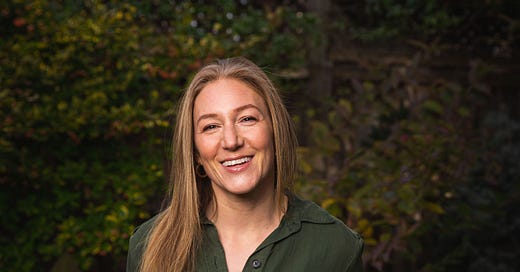



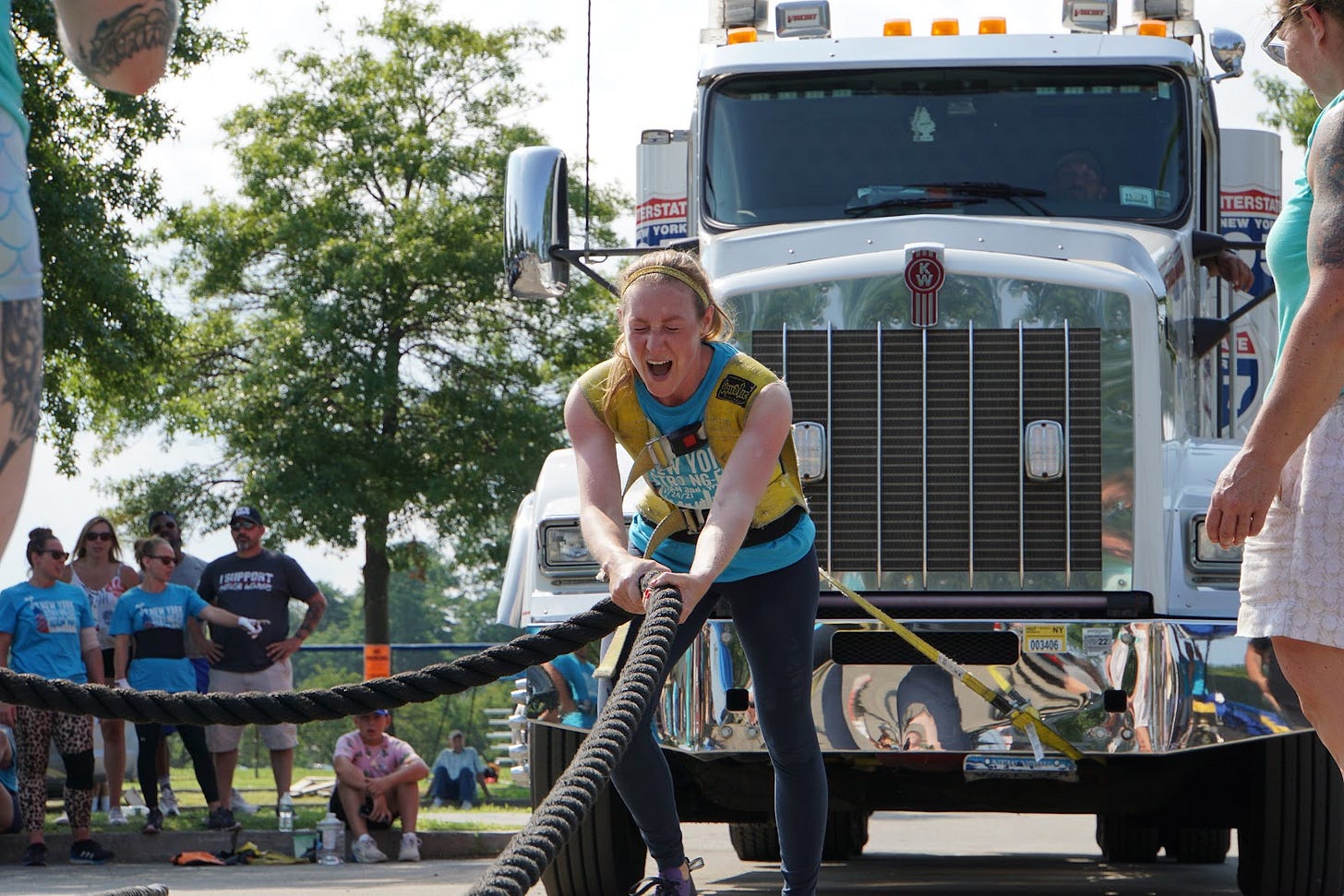
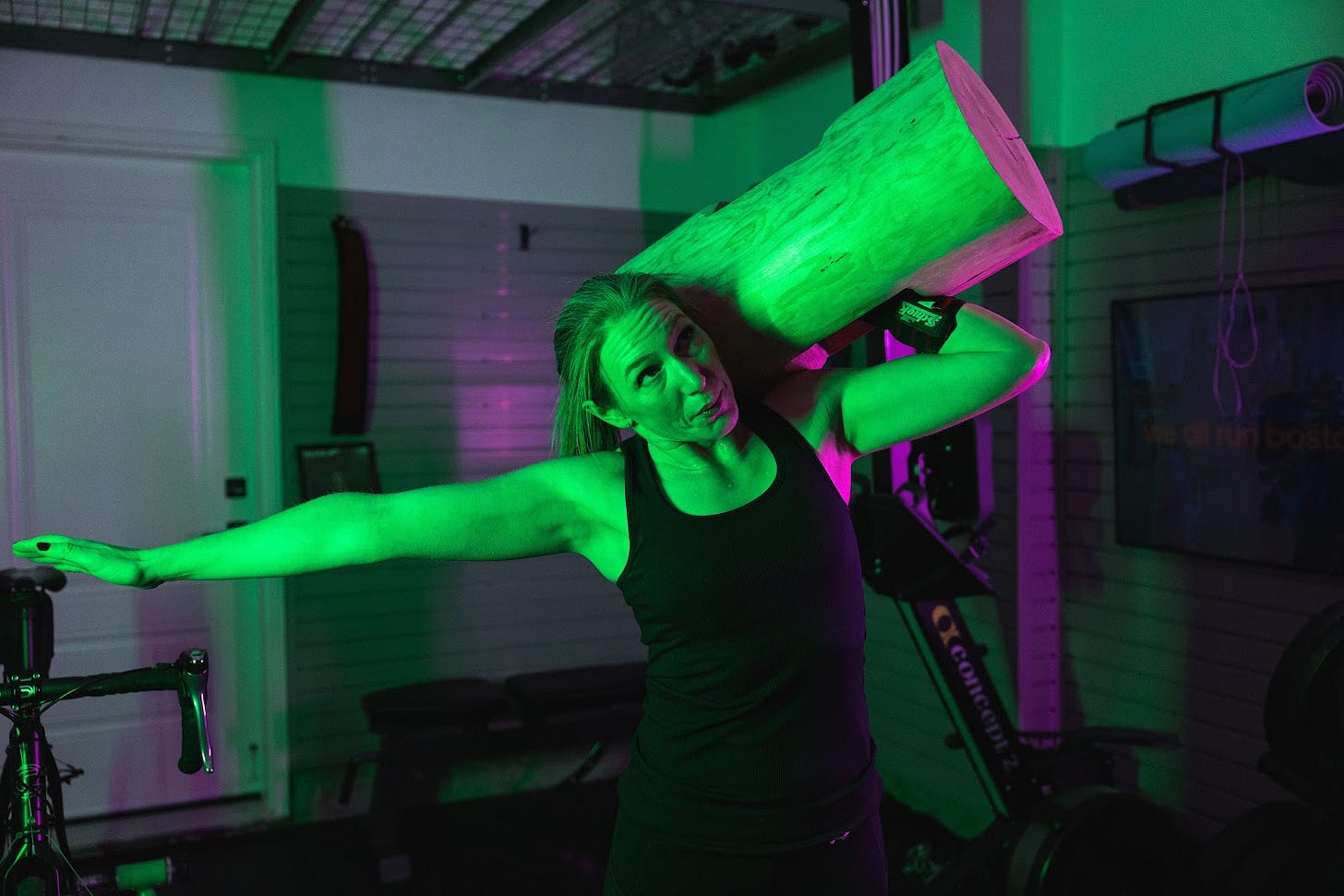
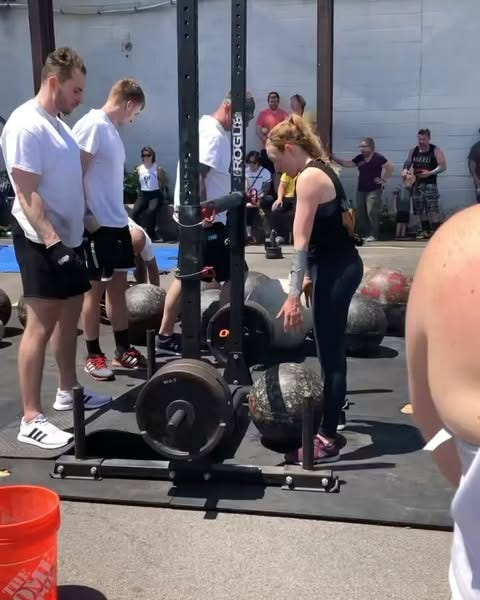

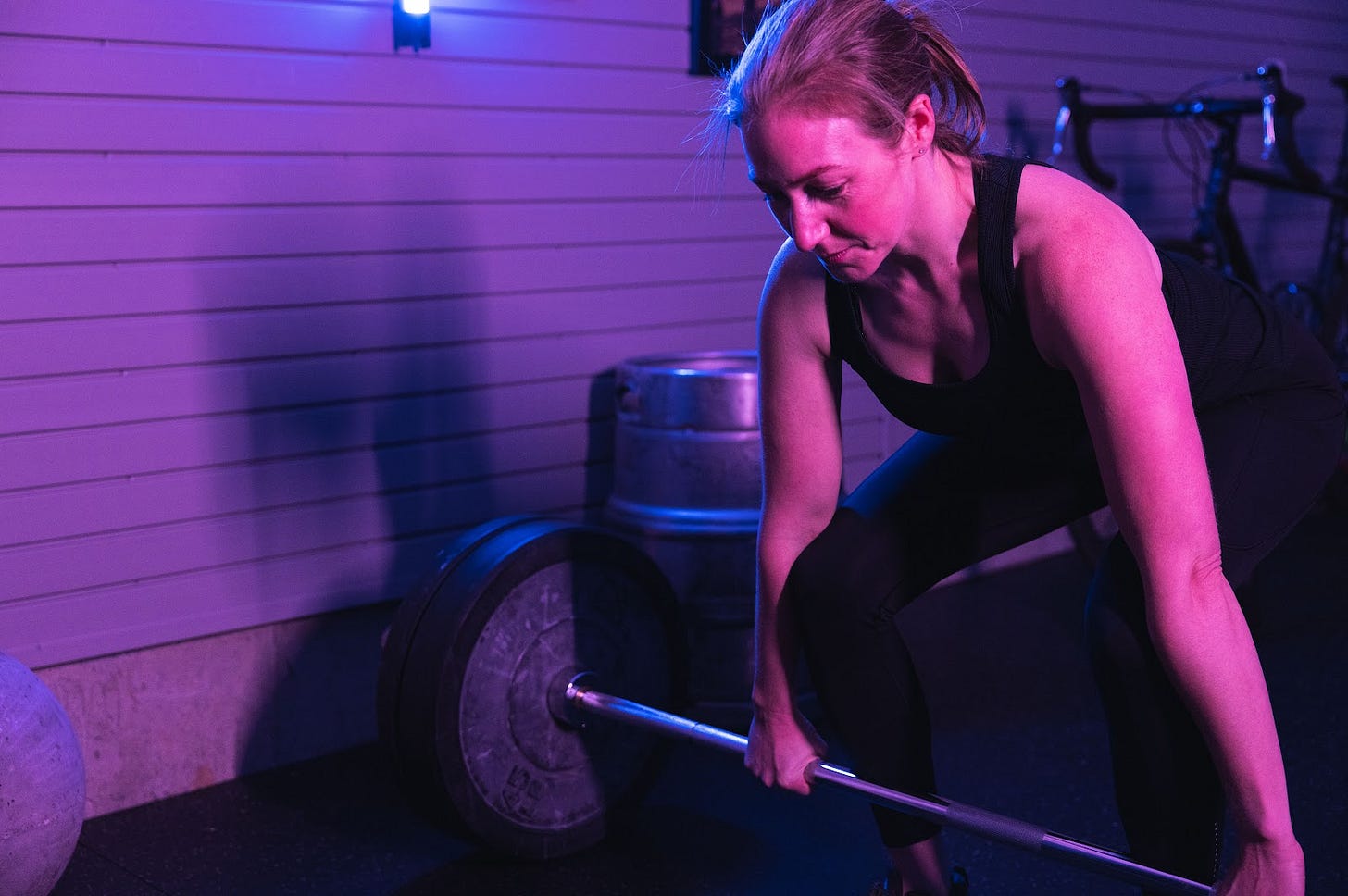

Congratulations, Alyssa! Love hearing about your journey into the competition Strongman space and publishing! Which one requires more stamina and endurance, do you think?? 😂